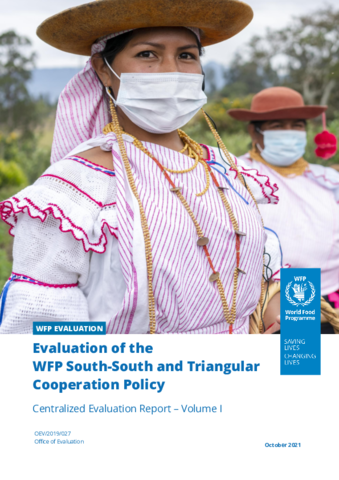
The evaluation assessed the relevance, effectiveness, coherence and sustainability of the Policy and its implementation from 2015 to 2020. The WFP Strategic Plan (2014-2017) highlighted the role of SSTC as a tool to strengthen local capacity especially in relation to social safety nets and school feeding. The Policy provides a brief overview of SSTC in the WFP programme of work at the time of policy development and describes several examples of WFP-supported South-South cooperation, including the work of the Centre of Excellence in Brazil.
The evaluation findings are largely positive with regard to the quality of the SSTC policy, the results of its implementation and WFP's management of internal and external factors influencing support for SSTC during the review period of 2015‒2020.
Since 2015 WFP has broadened and systematized its SSTC engagement, and it is currently among the UN entities that have made the most progress towards SSTC mainstreaming. The process of institutionalizing SSTC is ongoing, however, and SSTC is not yet fully mainstreamed across WFP units and thematic areas
WFP’s comparative advantage in supporting SSTC lies in its extensive field presence and networks and its thematic experience in relation to food security, logistics and supply chains. Its centres of excellence also provide an additional comparative advantage in promoting and supporting SSTC through dedicated hubs.
Increasing WFP engagement in SSTC has been supported by, and has the potential to contribute to, WFP’s mandate, which spans both saving lives and changing lives. Within WFP, SSTC has until now been largely discussed as a modality for country capacity strengthening. The evaluation findings indicate, however, that SSTC also plays an important role in supporting host governments’ partnership objectives, especially for countries that act predominantly as SSTC providers.
